

Stress can affect people of all age groups regardless of their gender and social backgrounds. Adolescents can experience stress ranging from academic stress to realtionship problems. While some stress is necessary to motivate teenagers, too much stress can have an adverse effect. The Basics of Stress. Stress is a situation that triggers a particular biological response.
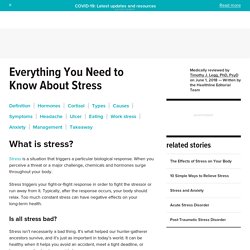
When you perceive a threat or a major challenge, chemicals and hormones surge throughout your body. Stress triggers your fight-or-flight response in order to fight the stressor or run away from it. Typically, after the response occurs, your body should relax. Too much constant stress can have negative effects on your long-term health. Is all stress bad? Stress isn’t necessarily a bad thing. We all feel stressed at times, but what one person finds stressful may be very different from what another finds stressful. Stress: Why does it happen and how can we manage it? Stress is a natural feeling of not being able to cope with specific demands and events. However, stress can become a chronic condition if a person does not take steps to manage it. These demands can come from work, relationships, financial pressures, and other situations, but anything that poses a real or perceived challenge or threat to a person’s well-being can cause stress.
Stress can be a motivator, and it can even be essential to survival. The body’s fight-or-flight mechanism tells a person when and how to respond to danger. 5 Things You Should Know About Stress. 6 Common Triggers of Teen Stress. Adolescent mental health. Introduction Adolescence (10–19 years) is a unique and formative time.
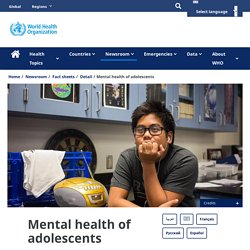
Multiple physical, emotional and social changes, including exposure to poverty, abuse, or violence, can make adolescents vulnerable to mental health problems. Promoting psychological well-being and protecting adolescents from adverse experiences and risk factors that may impact their potential to thrive are critical for their well-being during adolescence and for their physical and mental health in adulthood. Mental health determinants Adolescence is a crucial period for developing and maintaining social and emotional habits important for mental well-being. Multiple factors determine mental health outcomes. STRESS AND HEALTH: Psychological, Behavioral, and Biological Determinants. What Are the Effects of Cyberbullying?
Bullying—including cyberbullying—causes significant emotional, psychological, and physical distress.
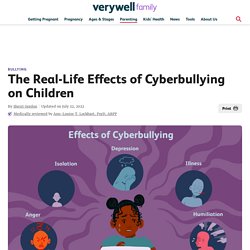
Academic Stress. Triggers of teen stress. Teen stress from a teen perspective. More teens in Singapore seeking help at IMH for school stress , Education News. SINGAPORE (THE NEW PAPER) - More teenagers from top schools are seeking help at the Institute of Mental Health (IMH) for school-related stress.

IMH said that stress-related, anxiety and depressive disorders are common conditions seen at its Child Guidance Clinics, which treat children aged six to 18. The clinics saw an average of about 2,400 new cases every year from 2012 to 2017. Since IMH does not track the causes of the disorders, it does not have statistics on cases related to school stress. However, Dr Lim Choon Guan, senior consultant and deputy chief of IMH's department of developmental psychiatry, said: "Over the past few years, I have seen more teenagers in our clinic who are from top schools and report experiencing school-related stress.
" Replying to The New Paper's queries, Dr Lim said this trend does not necessarily mean more youth are feeling stressed about their studies but suggests they are more willing to seek help. This may lead them to have unrealistic expectations. Stress among Teens in Singapore. The Effects of Long-term Stress on Adolescents. Let's start off by stating what is stress.
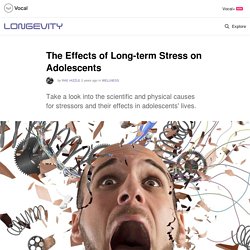
Stress is a physical, chemical, or emotional factor that causes bodily or mental tension. Stress is your body's way of responding to any kind of demand. It can be caused by both good and bad experiences. When people feel stressed by something going on around them, their bodies react by releasing chemicals into the blood. Now that we have that down, let's move onto what causes stress. The impact of stress on students in secondary school and higher education: International Journal of Adolescence and Youth: Vol 25, No 1. Methods A single author (MP) searched PubMed and Google Scholar for peer-reviewed articles published at any time in English.
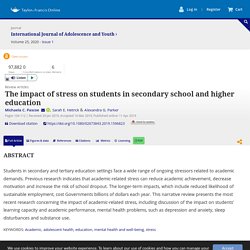
Stress can have positive effects on students. Stress is something that every college student knows way too well.
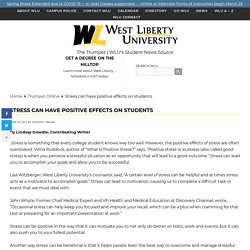
Summary: Effects of stress on adolescents. Stress. External sources of stress could include: Personal problemsWork problemsRelationship difficultiesPressure of studiesHealth problemsFinancial crisisUnemploymentLosses, e.g. bereavementUnexpected newsDaily hassles Internal sources of stress could include the following: Thinking stylesNegativity: "I'm useless, a loser, a failure.
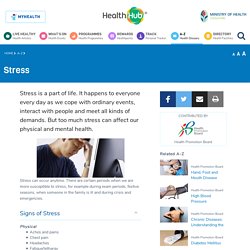
"Suspicion: "Why are they so nice to me? " How to help children and teens manage their stress. In the short term, stress can push a child to practice for her piano recital or inspire a teen to study when he’d rather be out with friends.
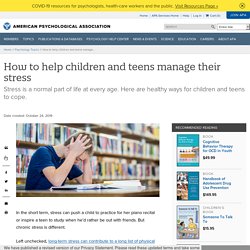
But chronic stress is different. Left unchecked, long-term stress can contribute to a long list of physical and mental health problems. Prolonged stress can cause high blood pressure, weaken the immune system and contribute to diseases such as obesity and heart disease. It can also lead to mental health problems such as anxiety and depression—disorders that are becoming more common in youth. In a 2018 study, researchers analyzed data from the National Survey of Mental Health and found that rates of anxiety and depression had increased in kids ages 6 to 17, from 5.4% in 2003 to 8.4% in 2011-12.
Stress in young people doesn’t always look like stress in adults. Managing Stress in Teens and Adolescents: A Guide for Parents. Teen stress is an important health issue.
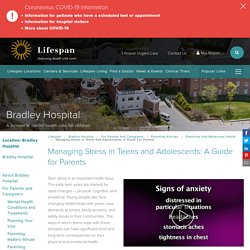
The early teen years are marked by rapid changes — physical, cognitive, and emotional. Young people also face changing relationships with peers, new demands at school, family tensions, and safety issues in their communities. The ways in which teens cope with these stressors can have significant short-and long-term consequences on their physical and emotional health. How to manage and reduce stress. Here, we would like to start, by giving you an introduction to what stress is, what the signs of stress are, what simple steps you can take when feeling stressed and provide practical advice for preventing it, to show why we are passionate about moving towards a less stressed nation. What is stress?
Stress is a feeling of being under abnormal pressure. This pressure can come from different aspects of your day to day life. Such as an increased workload, a transitional period, an argument you have with your family or new and existing financial worries. You may find that it has a cumulative effect, with each stressor building on top of one another. During these situations you may feel threatened or upset and your body might create a stress response. Coping With Stress During Childhood and Adolescence. Helping children cope with stress, Lifestyle News. An international study reported last year suggests that Singapore students experience higher levels of anxiety than those from many other countries. The study by the Organisation for Economic Cooperation and Development (OECD) polled 540,000 students from 72 countries and economies.
It showed that 66 per cent of students across all OECD countries said they were worried about poor grades in school. Among Singapore students, it was 86 per cent. Ms Tan Wei Yin, 40, for one, is careful not to over-emphasise academic results with her nine-year-old son. "One way of easing stress is by not having too much expectation when it comes to the academic," says Ms Tan, an executive in the insurance industry. But the demands of school impose pressure on her only child, Chee Tiong, as well as other school-going children. Two years ago, when Ms Tan's son was in Primary 1, she set him a target of completing one chapter of an assessment book every day, on top of his school homework. Summary: Stress Coping Strategies.